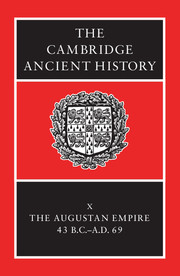19 - Literature and society
from PART IV - ROMAN SOCIETY AND CULTURE UNDER THE JULIO-CLAUDIANS
Published online by Cambridge University Press: 28 March 2008
Summary
DEFINITION OF THE PERIOD
While the age of Golden Latin is accepted as straddling the late republican and Augustan periods, the division between these two is particularly arbitrary, with no satisfactory date to set as the boundary – neither the death of Cicero in 43 B.C. nor the victory of Octavian in 31. Sallust survived into the 30s, but is properly classified as republican on the basis both of subject-matter and of attitudes; Nepos, still alive several years after Actium, likewise looks back to the last period of the Republic and shows no real affinity to the new age; Marcus Varro produced a great part of his work during Cicero's lifetime and his De Re Rustica in 37/36 B.C., although he was still writing when he died in 27, the year when the name ‘Augustus’ appeared, to distinguish the new era beyond doubt. On the other hand, within a year or two of 40 B.C. the emergence of Octavian Caesar as champion and saviour in the first Eclogue establishes Virgil as an Augustan from the start; while the fourth of the series, for all its puzzles, is already looking into a future of peace and prosperity. The dedication to Maecenas of both Epodes and Satires 1 attaches Horace openly to the imperial entourage, even if the decisive poems belong relatively late in the decade. The 30s are in every way a period of transition, in literature as in politics. The two previous decades had seen the great advances of Catullus, Lucretius and Cicero, the last with his expressed determination to make Latin literature the equal of Greek in every department.
Keywords
- Type
- Chapter
- Information
- The Cambridge Ancient History , pp. 905 - 929Publisher: Cambridge University PressPrint publication year: 1996
References
- 1
- Cited by

